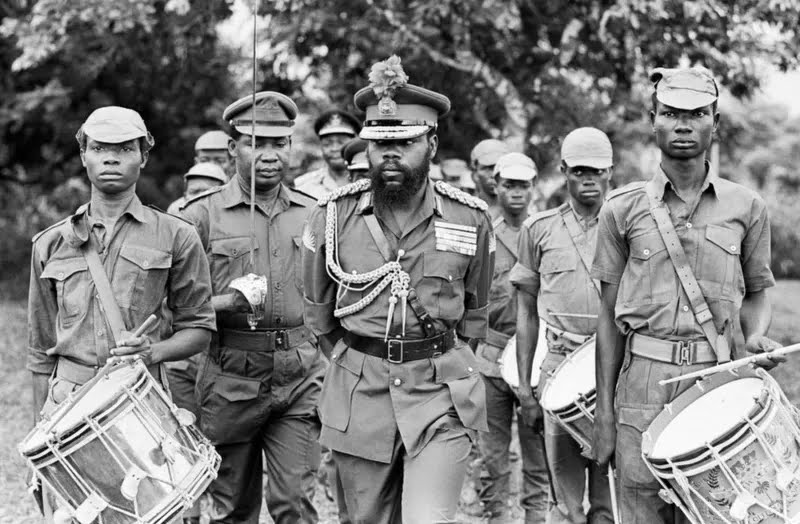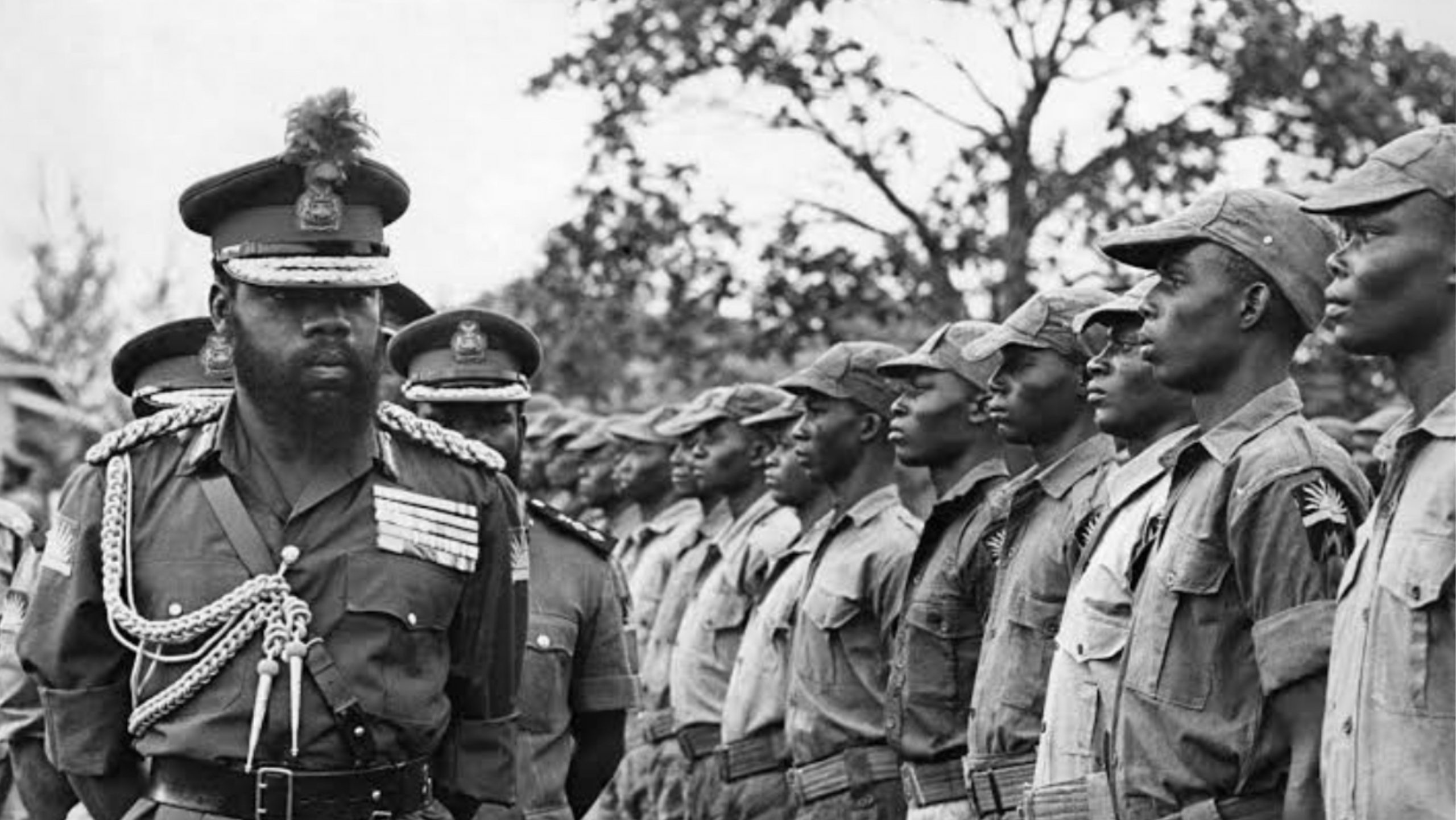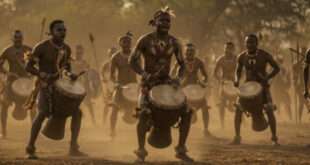Chukwuemeka “Emeka” Odumegwu-Ojukwu (November 4, 1933 – November 26, 2011) was a Nigerian military officer, statesman, and politician who led the breakaway Republic of Biafra from 1967 to 1970. He was also the military governor of Nigeria’s Eastern Region in 1966. From 1983 until his passing in 2011 at the age of 78, he was actively involved in politics.
Early life and education
On November 4, 1933, Sir Louis Odumegwu Ojukwu, an Igbo businessman from the present-day Nnewi, Anambra State in southeast Nigeria, gave birth to Chukwuemeka “Emeka” Odumegwu-Ojukwu.
Sir Louis worked in the transportation industry and became Nigeria’s richest man by capitalizing on the post-World War II economic boom. He started his academic life in Lagos, southwest Nigeria.
In 1943, when he was ten years old, Emeka Ojukwu began his secondary education at CMS Grammar School in Lagos. Later, in 1944, he changed schools and enrolled at King’s College in Lagos. There, he got into trouble and spent a short time in jail for assaulting a British teacher who broke up a student strike in which he participated. Local publications in the area ran extensive coverage of this incident.
At the age of 13, his father sent him to the UK to further his education. He first attended Epsom College and then Lincoln College, Oxford University, where he obtained a master’s degree in History. In 1956, he went back to colonial Nigeria.
Ojukwu began his career in the government of Eastern Nigeria as an administrative officer in Udi, which is now Enugu State. After serving in the colonial civil service for two years, he left in 1957 in an effort to escape his father’s influence over his civil service career. He initially enlisted in the military in Zaria as a non-commissioned officer (NCO).
Because of his father’s (Sir Louis) political maneuvering with the then-Governor-General of Nigeria (John Macpherson) to deny Emeka an officer-cadetship, Ojukwu was obliged to enlist as an NCO.
Emeka persisted despite the fact that Sir Louis and Governor-General Macpherson thought she wouldn’t adhere to the demanding NCO schedule. The British Depot Commander nominated Emeka for an officer’s commission following an incident in which Ojukwu corrected a drill sergeant’s mispronunciation of the safety catch of the Lee-Enfield.303 rifle.
Emeka traveled from Zaria first to Teshie, Ghana’s Royal West African Frontier Force Training School, and then to Eaton Hall, where he got his appointment as a 2nd Lieutenant in March 1958.
He was one of the first and few new graduates to be appointed to the army. Later, he went to the Small Arms School in Hythe and the Infantry School in Warminster. He was deployed to the Army’s Fifth Battalion in Kaduna after completing additional military training.
Only 15 of the 250 officers in the Nigerian Military Forces at the time were natives of the country. 6,400 additional ranks were available, 336 of which were British. After working for Major General Johnson Thomas Aguiyi-peacekeeping Ironsi’s mission in the Congo, Ojukwu was promoted to Lieutenant-Colonel in 1964 and transferred to Kano, where he oversaw the 5th Battalion of the Nigerian Army.
1966 military coups and other key moments in the Nigerian Civil War.
When Major Patrick Chukwuma Kaduna Nzeogwu executed and declared the violent military coup in Kaduna, also in northern Nigeria, on January 15, 1966, Lieutenant-Colonel Ojukwu was in the northern Nigerian city of Kano. To Ojukwu’s credit, the coup lost a lot of its momentum in the north, where it had previously been successful.
Major-General Aguiyi-Ironisi, the Supreme Commander of the Nigerian Armed Men, was supported by Lt. Col. Odumegwu-forces. Ojukwu’s Although the coup had failed in other regions of the nation, Major Nzeogwu was in charge of Kaduna.
Aguiyi-Ironsi assumed control of the government, making history’s first military leader. He appointed military governors for the four regions on January 17, 1966, a Monday. Lt. Col. Odumegwu-Ojukwu was chosen to serve as the Eastern Region’s military governor.
Others included Lt.-Cols. David Akpode Ejoor, Francis Adekunle Fajuyi, and Hassan Usman Katsina (North) (Mid West). Along with Brigadier B.A.O. Ogundipe, Chief of Staff, Supreme Headquarters, Lt. Col. Yakubu Gowon, Chief of Staff, Army HQ, Commodore J. E. A. Wey, Head of the Nigerian Navy, Lt. Col. George T. Kurubo, Head of the Air Force, and Col. Sittu Alao, the Supreme Military Council was founded by these persons.
The 1966 anti-Igbo pogrom began on May 29. Odumegwu Ojukwu faced difficulties since he did everything in his ability to avoid retaliation and even urged individuals to come back after receiving assurances of their safety from his alleged colleagues in the north and the west.
Majors Murtala Muhammed, Theophilus Yakubu Danjuma, and Martin Adamu were among the officers that led the bulk of Northern soldiers in a mutiny on July 29, 1966, which later turned into a “Counter-Coup” or “July Rematch.”
Due to the efforts of the brigade commander and the reluctance of northern officers stationed in the area, the coup attempt in the southeast of Nigeria, where Ojukwu served as the military governor, was unsuccessful (partly due to the mutiny leaders in the East being Northern whilst being surrounded by a large Eastern population).
General Aguiyi-Ironsi, the Supreme Commander, and Colonel Fajuyi, his host, were abducted and slain in Ibadan. Ojukwu persisted on maintaining the military hierarchy after admitting Ironsi’s death.
Brigadier Babafemi Ogundipe followed Ironsi as the most senior army officer. Although Gowon and Ojukwu held the same rank in the Nigerian Army, the counter-coup commanders urged that Yakubu Gowon be appointed as the nation’s leader.
Ogundipe was unable to marshal sufficient force in Lagos to assert his authority since the Guard Battalion of soldiers at his disposal was under the command of coup participant Joseph Nanven Garba. Ogundipe decided to withdraw after realizing this.
Therefore, Ogundipe could not execute Ojukwu’s demands without the coup planners’ consent (which they did not). As a result of this, Ojukwu and Gowon got into a stalemate, which set off a chain of events that eventually led to the Nigerian civil war.

General Joseph Ankrah organized a peace conference in Aburi, Ghana, in January 1967, and the Nigerian military leadership traveled there. Following the return of the leadership to Nigeria, the implementation of the accords made at Aburi broke down, and on May 30, 1967, Colonel Odumegwu-Ojukwu declared Eastern Nigeria a sovereign state to be known as Biafra:
“Having mandated me to proclaim on your behalf, and in your name, that Eastern Nigeria be a sovereign independent Republic, now, therefore I, Lieutenant Colonel Chukwuemeka Odumegwu-Ojukwu, Military Governor of Eastern Nigeria, by the authority, and pursuant to the principles recited above, do hereby solemnly proclaim that the territory and region known as and called Eastern Nigeria together with her continental shelf and territorial waters, shall, henceforth, be an independent sovereign state of the name and title of The Republic of Biafra”
Gowon attacked Biafra and proclaimed war on it on July 6, 1967. The 1968 Niamey Peace Conference, presided over by President Hamani Diori, and the OAU-sponsored Addis Ababa Conference, presided over by Emperor Haile Selassie, were additional attempts to avert war in addition to the Aburi Accord. The generals Ojukwu and Gowon’s final diplomatic effort to end the conflict was this.
With Ojukwu, the Biafran Supreme commander’s sanction, some accused coup plotters from July 1966 and Major Victor Banjo were put to death for treason during the war in 1967. Major Ifeajuna was among those put to death.
The defendants had maintained that they did not commit treason since they wanted to negotiate a truce with the federal government.
After 2.5 years of fighting and malnutrition, a gap opened up in the Biafran front lines, which the Nigerian military exploited. Ojukwu was persuaded to flee the country once it became clear that the war would not be won in order to avoid being killed.
He transferred authority to his deputy, Chief of General Staff Major-General Philip Effiong, on January 9, 1970, and departed for the Ivory Coast. There, President Félix Houphouet-Boigny, who had recognized Biafra on May 14, 1968, had granted him political asylum.
Return to Nigeria
Ojukwu started his campaign to go back to Nigeria in 1981. On May 18, 1982, Ojukwu received a pardon from Nigerian President Shehu Aliyu Usman Shagari, enabling him to reenter Nigeria as a private citizen. On June 18, Ojukwu returned to Nigeria from Ivory Coast.
In 1983, Ojukwu announced his candidacy for the Nigerian Senate. Although a court made an attempt to overturn the decision in September of that year, charging fraud in the election results, the official count showed him losing by 12,000 votes.
The Shagari government was overthrown in the Nigerian coup d’état of December 31, 1983, making the contentious outcome moot. The Buhari administration imprisoned hundreds of political figures in the beginning of 1984, including Ojukwu, who was housed in Kirikiri Maximum Security Prison. Later the same year, he was liberated.
In 1994, Ojukwu wed Bianca Onoh, a future ambassador and the former Miss Intercontinental. Three kids—Afamefuna, Chineme, and Nwachukwu—were born to the marriage. Ojukwu unsuccessfully ran for president under the Fourth Republic in 2003 and 2007.
Death
Ikemba Odumegwu Ojukwu, who was 78 years old, passed away in the UK on November 26, 2011, following a brief illness. On February 27, 2012, the day his remains was flown back to Nigeria from London before his burial on March 2, the Nigerian Army gave him the highest military honor and held a funeral parade for him in Abuja, Nigeria. In his Nnewi complex, he was laid to rest in a recently constructed mausoleum.
Together with Chief Obafemi Awolowo, he had a lavish funeral service in Nigeria that lasted nearly a week and included the procession of his remains through the country’s capital, Abuja, as well as the five Eastern states of Imo, Abia, Enugu, Ebonyi, and Anambra.
In addition, memorial ceremonies and open gatherings in his honor were conducted throughout Nigeria, notably in Lagos and Niger State, the region of his birth, as well as as far away as Dallas, Texas, in the United States. Among other notable people, Nigeria’s President Goodluck Jonathan and Ghana’s former President Jerry Rawlings attended his funeral.
 The African History Truly African
The African History Truly African

